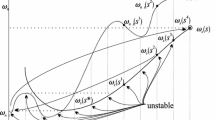Abstract
The application of uniform solutions has several drawbacks, notably their lack of cost efficiency and their inability to guarantee individual rationality. A ‘proper’ specification of uniform solutions, however, reveals that uniform solutions that satisfy individual rationality always exist. When all countries hold private information about their own reduction costs, there only exists one solution that always satisfies individually rationality without use of side payments and the requirement of dominant strategy implementation: The solution that selects the smallest individually preferred uniform reduction which also give a theoretical explanation of the ‘lowest common denominator effect’.
Similar content being viewed by others
References
Barrett, S. (1991), ‘International Environmental Agreements as Games’, in R. Pethig, ed., Conflicts and Cooperation in Managing Environmental Resources, Berlin: Springer-Verlag, pp. 11–36.
Barrett, S. (1994), ‘Self-enforcing International Environmental Agreements’, Oxford Economic Papers 46, 878–894.
Bohm, P. (1994), ‘On the Feasibility of Joint Implementation of Carbon Emission Reductions’, Research Papers in Economics 1994: 2, Department of Economics, University of Stockholm.
Boyer, M. and J-J. Laffont (1999), ‘Towards a Political Theory of the Emergence of Environmental Incentive Regulation’, RAND Journal of Economics 30(1), Spring, 137–157.
Brandt, U. S. (2002), ‘Actions Prior to Entering an International Environmental Agreement’, Journal of Institutional and Theoretic Economics 158, 695–714.
Eyckmans, J. (1997), ‘Nash Implementation of a Proportional Solution to International Pollution Control Problems’, Journal of Environmental Economics and Mangaement 33(3), 314–330.
Eyckmans, J. (1999), ‘Strategy Proof Uniform Effort Sharing Schemes for Transfrontier Pollution Problems’, Environmental and Resource Economics 14(2), 165–189.
Falkinger, J., F. Hackl and G. J. Pruckner (1996), ‘A Fair Mechanism for Efficient Reduction of Global CO2-Emission’, paper presented at the 7th Annual EAERE-Conference, Lisbon.
Finus, M. (2001), Game Theory and International Environmental Cooperation, Cheltenham, UK: Edward Elgar Publishing Ltd.
Greene, O. (1996), ‘Lessons from other International Environmental Agreements’, in M. Paterson and M. Grubb, eds., Sharing the Effort, Options for Differentiating Commitments on Climate Change, London: The Royal Institute of International Affairs, pp. 23–44.
Grubb, M. (1996), ‘On the Differentiating of Quantified Emission Limitations and Reduction Objectives for Annex 1 Countries’, in M. Paterson and M. Grubb, eds., Sharing the Effort, Options for Differentiating Commitments on Climate Change, London: The Royal Institute of International Affairs, pp. 45–60.
Hoel, M. (1991), ‘Global Environmental Problems: The Effects of Unilateral Actions taken by One Country’, Journal of Environmental Economics and Management 20, 55–70.
Hoel, M. (1992), ‘International Environmental Conventions: The Case of Uniform Reductions of Emission’, Environemntal and Resource Economics 2, 141–159.
Hoel, M. (1997), ‘Coordination of Environmental policy for Transboundary Environmental Problems?’, Journal of Public Economics 66, 199–224.
Kinley, R. and G. Terrill (1996), ‘Differentating and the FCCC: Provisions, Proposals by Parties, and some Options’, in M. Paterson and M. Grubb, eds., Sharing the Effort, Options for Differentiating Commitments on Climate Change, London: The Royal Institute of International Affairs, pp. 17–22.
Mäler, K. G. (1989), ‘The Acid Rain Game’, in H. Folmer and E. Van Ireland, eds., Valuation Methods and Policy Making in Environmental Economics, Amsterdam: Elsevier.
Mäler, K. G. (1990), ‘International Environmental Problems’, Oxford Review of Economic Policy 6, 80–108.
Mäler, K. G. (1993), ‘Acid Rain Game II’, Beijer discussion paper series, No. 32, Beijer International Institute of Ecological Economics, Stockholm.
Moore, J. (1992), ‘Implementation, Contracts and Negotiation’, in J. J. Laffont, ed., Advances in Economic Theory: Invited Papers for the Sixth World Congress of the Econometric Society, vol. 1, Cambridge University Press, pp. 182–268.
Moulin, H. (1980), ‘On Strategy-Proofness and Single Peakedness’, Public Choice 35, 437–455.
Moulin, H. (1994), ‘Serial Cost Sharing of Excludable Goods’, Review of Economic Studies 55, 936–976.
Newbery, D. M. (1990), ‘Acid Rain’, Economic Policy 11, 299–346.
Paterson, M. (1996), Global Warming and Global Policy, London: Routledge.
Sand, P. H. (1990), ‘International Cooperation: The Environmental Experience’, in J. T. Mathews, ed., Preserving the Global Environment: The Challenge of Shared Leadership, New York: W.W. Norton and Co., pp. 236–279.
Tirole, J. (1988), The Theory of Industrial Organisation, Cambridge, MA: The MIT Press.
Young, O. (1989), ‘The Politics of International Regime Formation: Managing Natural Resources and the Environment’, International Organization 43(3), 249–375.
Zeeuw, A. D. (1998), ‘International Dynamic Pollution Control’, in N. Hanley and H. Folmer, eds., Game Theory and the Environment, Cheltenham: Edgar Elgar, pp. 237–254.
Author information
Authors and Affiliations
Rights and permissions
About this article
Cite this article
Brandt, U.S. Are Uniform Solutions Focal? – The Case of International Environmental Agreements. Environmental and Resource Economics 25, 357–376 (2003). https://doi.org/10.1023/A:1024432709657
Issue Date:
DOI: https://doi.org/10.1023/A:1024432709657



